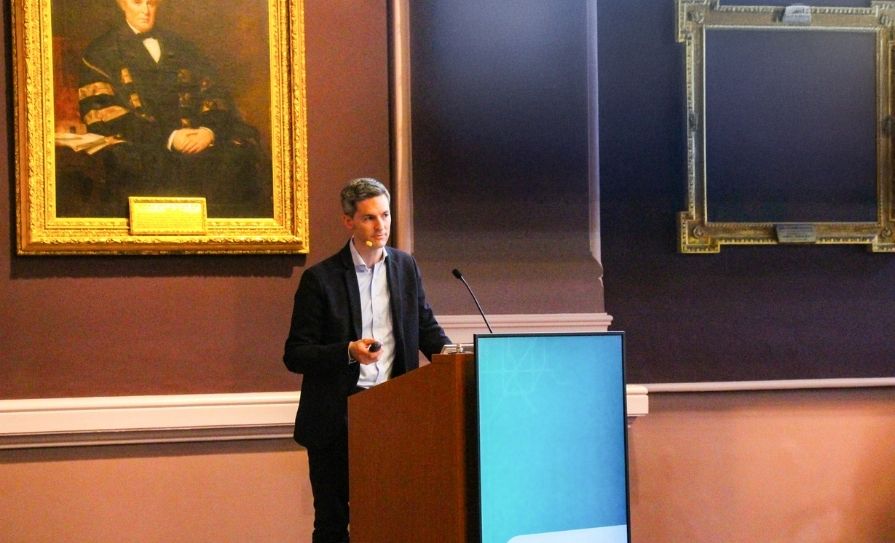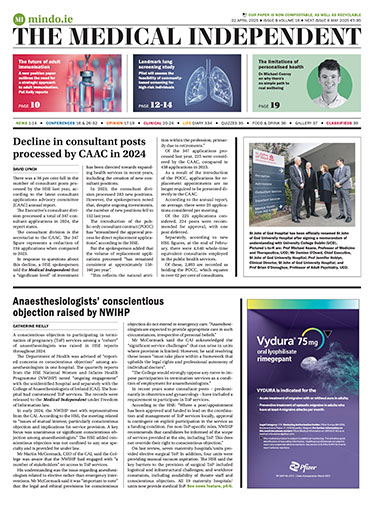Irish voters will go to the polls on Friday, May 25, when they will decide whether to remove or keep the Eighth Amendment of the Constitution.
A number of doctors have become heavily involved on both sides of the campaign (see sidebars).
Arguably doctors have already played an important role in the holding of this referendum. The medical evidence provided at last year’s Joint Committee on the Eighth Amendment of the Constitution by professionals such as Dr Maeve Eogan, Consultant Obstetrician and Gynaecologist at the Rotunda Hospital, Dublin; Dr Peter Boylan, Chair of the Institute of Obstetricians and Gynaecologists; and Dr Rhona Mahony, Master of the National Maternity Hospital, Holles Street, was regarded by many as having a significant impact on the thinking of the Committee members.
The Committee published its final report in December, with a majority voting in favour of repealing the Eighth Amendment and allowing unrestricted abortion up to 12 weeks.
If there is a ‘yes’ vote in favour of repeal next month, it seems inevitable that the legal situation regarding abortion access in Ireland will change considerably in the coming years.
While doctors on the ‘yes’ and ‘no’ side of the debate hold strongly divergent viewpoints (see sidebars) they seem united in the conviction that doctors have a unique and important role to play in the debate.
Whether it is by providing medical evidence or discussing issues, such as conscientious objection, many individual doctors are passionate about the upcoming referendum.
In terms of conscientious objection, earlier this year, a Medical Council spokesperson told the <strong><em>Medical Independent</em></strong> (<strong><em>MI</em></strong>) that its current guidance on the issue is found in its <em>Guide to Professional Conduct and Ethics for Registered Medical Professionals </em>in paragraph 49. The section notes that “you may refuse to provide or to take part in the provision of lawful treatments or forms of care, which conflict with your sincerely-held ethical or moral values”.
But it also notes if a doctor holds a conscientious objection to a treatment they must “inform the patient that they have a right to seek treatment from another doctor and give the patient enough information to enable them to transfer to another doctor to get the treatment they want”.
How this will work in any future health system that provides greater access to abortion services is of concern to some doctors on the ‘no’ side, who spoke to <strong><em>MI</em></strong>. However, doctors on the ‘yes’ side told <strong><em>MI</em></strong> that the issue should not prove challenging to deal with. (see sidebar, p5).
Regarding the wider issue involved, while some individual doctors have taken clear public stances, the position of representative bodies is more complicated.
Interestingly, the Eighth Amendment and the referendum did not particularly figure at the recent IMO AGM in Killarney, Co Kerry. When contacted the union told <strong><em>MI</em></strong> that it had nothing to add to a statement provided to this newspaper earlier this year.
In it, the IMO said it recognised that its members often hold strong and different views on this issue.
<img src=”../attachments/3841fa29-9581-4797-87bc-f7c622085497.JPG” alt=”” />
<strong>Dr Mary Favier</strong>
<h3>IMO</h3>
“However, doctors and medical professionals have additional responsibilities and concerns in relation to such issues because they need to have absolute clarity around the legal position in which they operate,” the spokesperson says.
“They need to have assurance about their ability to act in line with their conscience in a manner which respects their own views while also respecting the views and wishes of the relevant patients and the legal environment in which they operate.”
The IMO spokesperson did add that the union hoped the upcoming debate is “compassionate [and] informed”.
<h3 class=”subheadMIstyles”>Representatives</h3>
Consultants will not be receiving any direct guidance from the IHCA regarding how to vote in the upcoming referendum.
“The IHCA is not taking a position other than it defers any questions to their colleagues in the Institute of Obstetricians and Gynaecologists,” an IHCA spokesperson tells <strong><em>MI</em></strong>.
The Institute of Obstetricians and Gynaecologists already articulated a clear position in January this year. At the time the Institute said it “supports the recommendation of the Joint Committee on the Eighth Amendment to the Constitution that Article 40.3.3 be removed from the Constitution”.
“The Institute looks forward to continuing to assist in informing legislation to enhance women’s health and safety.”
For its part the NAGP tells <strong><em>MI</em></strong> that it is not taking “an official position on the Eighth Amendment”.
“Until the referendum has taken place, we will not be advising/guiding our members,” the NAGP spokesperson says.
The ICGP had not replied to our queries before deadline.
Earlier this year, a spokesperson for the Medical Council told <strong><em>MI</em></strong> that it currently provides guidelines on abortion in its <em>Guide to Professional Conduct and Ethics for Registered Medical Professionals</em>. The relevant section is paragraph 48. These guidelines reflect the current legal framework provided by the Protection of Life during Pregnancy Act 2013. But this would change to meet any legislative changes in the future following the referendum.
The Department of Health is planning ahead. In his evidence to the Committee in November, the Department’s Chief Medical Officer (CMO) Dr Tony Holohan told members “pending a decision on the policy direction, the Department of Health is working with the Office of the Attorney General and the Department of the Taoiseach to explore and research the Constitutional and policy issues involved”.
<strong><em>MI</em></strong> understands there has been significant correspondence between the office of the CMO and the Department of Health and the HSE in recent months on issues pertaining to the Eighth Amendment.
According to the Irish Family Planning Association (IFPA), between January 1980 and December 2016, at least 170,216 women and girls travelled from the Republic of Ireland to access abortion services in another country. In 2016, 3,265 women and girls gave Irish addresses at UK abortion services, according to the IFPA.
<div style=”background: #e8edf0; padding: 10px 15px; margin-bottom: 15px;”> <h3 class=”subheadMIstyles”>Working to defend the Eighth</h3>
Medical doctors are involved with groups and campaigns seeking a ‘no’ vote in the upcoming referendum.
“I am in favour of keeping the Eighth Amendment because it is a guarantee that the unborn child will be considered as a patient on an equal footing as the other patient in a pregnancy, which is the mother,” Dublin GP Dr Orla Halpenny and member of Doctors for Life tells <strong><em>MI</em></strong>.
“We have always been trained to regard a pregnancy as a case of two patients, a mother and the infant. Whether the infant is very young, or just about to be born, or recently born. There are two lives at stake in a pregnancy.”
Dr Halpenny believes that the Eighth Amendment has been a positive force in Irish life.
“The Eighth Amendment has been the instrument whereby our Constitution has always been obliged to regard life within the womb as human life and entitled to the right to life,” she says
Like those on the opposing ‘yes’ side, Dr Halpenny feels doctors do have a specifically vital role in the debate.
“Well people are entitled to look to doctors as a source of the medical facts in this case,” she says.
“While for many people it is a moral choice, it is a choice that is governed by what can and cannot be achieved in medicine.
<img src=”../attachments/b082b618-ed7e-414b-9991-66ab3148e11b.JPG” alt=”” />
<strong>Dr Orla Halpenny</strong>
“I think people are entitled to ask doctors for objective evidence-based information. I think doctors are obliged to provide that information, there are doctors on both sides of the debate and that’s perfectly acceptable in any democracy. But I certainly think doctors, when asked for an opinion, should give it.
“[However] not all doctors want to be active. One of the things with medicine is that we try and be available to all patients, to people from every background, so many doctors are uncomfortable in expressing views which might prejudice patients against them. It might mean you are turning away the very patient that needs your help most.”
But if the Eighth Amendment is repealed and abortion services become more widely available in Ireland in the future, Dr Halpenny feels the issue of conscientious objection will be important.
“I think it is worth pointing out that the right to conscientious objection is under attack in other jurisdictions. There are voices being raised to the effect if a doctor isn’t happy to prescribe certain medications or be involved in certain procedures then he or she should select a different profession.
“So I’m not comforted by it. If the law changes, if the issue of conscientious objection comes to the fore, we will certainly be fighting hard to maintain it.
“But I wouldn’t be confident that the right of conscientious objection will be respected in the future. It might be at the moment, or for the next 10 years. But I think it is a very fragile thing. If the State determines what is to be allowed and not allowed under conscientious objection then I don’t see it in a very firm sense.”
Kildare-based GP Dr Anthony Reilly told <strong><em>MI</em></strong> he is not happy with the indications around conscientious objection.
“The Government is saying that doctors like myself who would have a conscientious objection to this, need not participate,” said Dr Reilly.
However, Dr Reilly said he does not believe this to be true. He argues that by referring a patient to another doctor in order to possibly access abortion services he would in fact be participating.
“That is absolutely unconscionable to me,” says Dr Reilly.
“To say that this is a proper conscientious objection clause is absolutely untrue. It’s simply not the case.”
Dr Reilly describes himself as a “passionate supporter of saving the Eighth Amendment” who hopes with “every fabric of my being that this is rejected”.
One issue Dr Reilly agrees with doctors on the opposing ‘yes’ side of the debate is that he believes the medical profession has an important role to play in the campaign.
“I think doctors have a very important role to play because I think doctors are very trusted by their patients,” says Dr Reilly.
“I think we need to provide the public with the facts around abortion. This is being presented by the Government as something as necessary for healthcare of the women of Ireland and the Eighth Amendment is being presented as something that is a threat to the health of the women of Ireland.
“The figures simply do not bear this out whatsoever…
“We are looking at a scenario where, thankfully, maternal mortality rates are extraordinarily low. Our rates are world class.
“To paint this as an essential part of improving the health of the women of Ireland is frankly not borne out whatsoever by the figures.”
<h3 class=”subheadMIstyles”>Safest</h3>
On the substance of the argument, Dr Reilly does not believe there is a convincing medical argument to repeal the Eighth Amendment.
“The Eighth Amendment has served us really very well for the past 35 years. I think that we have one of the very safest maternity services in the whole world,” says Dr Reilly.
“I think that respect for the life of both the mother and the unborn is something that we can be extremely proud of and I think that our record in maternity care is something that we can be extremely proud of. I think that, unfortunately, we are living in a world that has really lost so much respect for the life of the unborn.”
</div>
<div style=”background: #e8edf0; padding: 10px 15px; margin-bottom: 15px;”> <h3 class=”subheadMIstyles”>Seeking to repeal the Eighth</h3>
A number of doctors are playing a big role in various campaign groups seeking a vote favouring repeal in next month’s referendum.
Cork GP Dr Mary Favier, a member of Doctors for Choice, says doctors and their experience are vital in this referendum debate.
“I think the medical profession is one of the most important voices in this whole campaign to remove the Eighth [Amendment], second only to the voices of the women themselves,” she tells <strong><em>MI</em></strong>.
“I think that’s because, as doctors, we have actually seen the impact the Eighth Amendment has had on the healthcare we can offer women; the limitations it places. You can see the obstetricians in the last number of weeks are really detailing that.
“One of the reasons I think general practitioners are so involved, is that we have actually seen the patients, particularly the women who travel and all the issues that come with that.
“I think what is happening this time is that doctors are appreciating that the medical voice was largely silent in the 1983 referendum and I think we are feeling a responsibility to be heard and counted on behalf of our patients.
“I think you will see that amplify over the next couple of weeks.”
On the central issue of the patient, Dr Favier says “through time women have always wanted to manage their fertility needs…Irish women are no different”.
“We have been exporting that problem. We really need to face that reality and give Irish women the healthcare they are entitled to at home so they can make their own decisions,” she added.
If the repeal side wins and abortion access is eventually expanded in Ireland, Dr Favier says she thinks the issue of conscientious objection should not be too big a challenge for the health system.
“I think it can be dealt with and has been already under the Protection of Life during Pregnancy Act,” she tells <strong><em>MI</em></strong>.
“Conscientious objection is valid and I have no issue with that being supported. But it needs to be regulated and it needs to be in the context that it doesn’t impinge on the ability of a woman to actually access her healthcare.
“So conscientious objection yes, but no obstruction.
“I don’t think it’s beyond [us] to do that while respecting people’s absolute right not to participate if they do not wish to. That is not unusual and it has been done successfully in other countries. So I don’t expect it to be a big issue in Ireland, but it is an important one and I think it will require further discussion.”
Dr Mark Murphy, a GP in Dublin, is also a member of Doctors for Choice and he is the medical spokesperson for the ‘Together for Yes’ campaign. He too believes that doctors have a unique role to play in the current debate.
“This is a healthcare issue and a critical moment for our profession,” Dr Murphy tells <strong><em>MI</em></strong>.
“We cannot stand over the harms which the Eighth Amendment has done and how it intrudes on obstetric and crisis pregnancy management.
“Voting to remove the Eighth Amendment will send a message to our patients that Irish doctors trust women and that we are willing to provide evidence-based and compassionate care.”
Asked how particular concerns for some doctors should be handled, such as the ability of a doctor to conscientiously object in the event of abortion becoming more freely available in the future, Dr Murphy was clear.
“I fully support the right of Irish doctors to conscientiously object to the provision of abortion services in the future,” says Dr Murphy.
“This is standard professional practice internationally and has been and will be reflected in the Irish Medical Council guidelines.”
<img src=”../attachments/f14452b8-4806-458d-8c43-0a37af134351.JPG” alt=”” />
<strong>Dr Mark Murphy</strong>
<h3 class=”subheadMIstyles”>Unsafe</h3>
Dr Murphy has already played a relatively high profile media role in the referendum campaign.
“The ability of Irish doctors to provide evidence-based and compassionate care for women facing a crisis pregnancy is curtailed by the constitutional prohibition of abortion – the Eighth Amendment,” says Dr Murphy.
He adds that he believes the Amendment “was designed to prevent abortion, but it has not stopped abortion”.
“It has placed unsafe abortion in Ireland, with 1,500 women taking the abortion pill last year, unsupervised, through unregulated online providers, with the threat of a 14-year prison sentence.
“Many women can’t afford to travel to the UK… It is not right that women are left alone to access a healthcare service. Of course, the Eighth Amendment has forced 170,000 women to travel abroad to access abortion services in the UK.”
The legacy of the Ms Savita Halappanavar case, and the evidence given by medical institutions, has an influence on Dr Murphy and prompted his active role in the current campaign.
“The main reason I am actively campaigning for a ‘yes’ vote is that the Eighth Amendment has caused such harm and distress to women in Ireland – and to Irish doctors,” he says.
“The Institute of Obstetricians has outlined how the Eighth Amendment harms women. We are aware of the tragedies. Savita Halappanavar was refused a termination, even though she presented with an inevitable miscarriage, because a foetal heartbeat was detectable.
“Of course all 170,000 women who have been forced abroad have been affected adversely by the Eighth Amendment, by the stigma it creates and the difficulties in travelling.”
</div>













Leave a Reply
You must be logged in to post a comment.